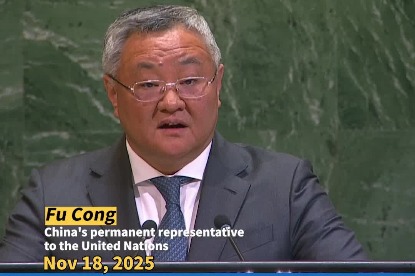G20 summit to move Africa to center stage


For the first time in history, the world's most powerful economic forum, the G20, will convene on African soil. This moment is more than a ceremonial milestone — it is a profound symbol of the continent's growing relevance in global governance and the collective aspiration for a more balanced world order.
For decades, Africa has been positioned as the "subject" of global policy debates rather than an equal participant in shaping them. Yet as global crises increasingly demand inclusive solutions — from climate change and debt distress to digital transformation and food security — Africa's voice can no longer remain peripheral.
The 2025 G20 Summit in South Africa presents a defining opportunity to recalibrate the rules of global engagement. It is a chance to move beyond narratives of aid and dependency toward genuine partnership, investment and reform. For African nations, this is not merely about hosting the world; it is about reframing the world's priorities through Africa's lens — one that values justice, sustainability and shared prosperity.
The G20 Summit in Africa comes at a moment of deep transformation in global politics and economics. The world is grappling with multiple, overlapping crises — from climate emergencies and debt distress to global supply chain realignments and digital divides.
In this context, holding the G20 in Africa is not an act of symbolism but a recognition of necessity.
The international community can no longer address global challenges without Africa's active participation and leadership.
Africa is home to the world's youngest population, a vast renewable energy potential and an expanding digital economy — all key ingredients for global resilience and innovation. Yet the continent continues to bear the disproportionate burden of structural inequality: unsustainable debt, limited access to finance and vulnerabilities to climate shocks. Hosting the G20 in Africa allows the agenda to be reframed — from managing crises for Africa to co-creating solutions with Africa.
Moreover, the summit represents a chance to advance reform in global financial institutions that often dictate the continent's fiscal realities. By bringing African priorities to the foreground — such as debt restructuring, fair trade, climate adaptation financing and equitable technology access — the G20 can evolve from a forum of economic giants to one of shared humanity and mutual accountability. The choice of Africa as host underscores an emerging consensus — the future of global governance will either include Africa at its center or risk irrelevance.
As Africa welcomes the world to its soil, expectations are understandably high. This is a historic opportunity for African leaders, policymakers and thinkers to shape an agenda that speaks to the continent's development realities and aspirations. The G20 in Africa must not be reduced to photo opportunities or diplomatic rituals, but should become a platform for structural transformation.
First, Africa should push for a reformed global financial architecture that addresses the continent's chronic debt vulnerabilities and financing inequities. Many African countries spend more on servicing debt than on health or education — a clear sign that the global financial system is broken. Africa must call for fairer lending terms, greater access to concessional finance and a meaningful voice in institutions such as the International Monetary Fund and the World Bank.
Second, climate finance must be elevated from pledges to tangible delivery. Africa contributes less than 4 percent of global emissions yet faces the harshest climate impacts. The G20 should commit to scaling up adaptation funding, supporting green industrialization and accelerating technology transfer.
Third, trade and industrial policy must be realigned to empower African value addition rather than perpetuate raw material dependence. The African Continental Free Trade Area provides a unique framework for regional integration, and G20 partners should invest in infrastructure, logistics and skills to make it succeed.
Finally, Africa should emphasize digital inclusion and human capital development as global public goods. The next frontier of competition and cooperation will be technological — and Africa's youths, if empowered, can be the bridge between innovation and equitable growth.
In essence, Africa's participation in the G20 should go beyond representation; it must be transformative. The continent's leaders must speak with one voice and champion a vision of global governance rooted in fairness, sustainability and shared prosperity.
China's growing engagement with Africa offers valuable lessons for how the G20 can evolve toward a more inclusive and balanced order. Over the past two decades, China has deepened partnerships across the continent through trade, investment, infrastructure and green cooperation — not merely as a donor, but as a development partner committed to mutual benefit. This South-South cooperation framework, rooted in respect for sovereignty and shared progress, mirrors the kind of partnership that Africa seeks within the G20.
At a time when the global financial system remains constrained by conditionalities and asymmetries, China's approach to financing and capacity building provides an alternative model — one that prioritizes infrastructure, connectivity and local industrialization. Through initiatives such as the Belt and Road Initiative and the Global Development Initiative, and its expanding role in climate finance, China has demonstrated that investment in Africa is not charity, but common prosperity.
As the G20 convenes in Africa, China is well-positioned to champion reforms that amplify the voices of developing nations. It can use its influence to push for fairer multilateral lending mechanisms, accelerate the delivery of green financing and promote digital cooperation that bridges the technology gap. Moreover, China's emphasis on "a community with a shared future for humanity" aligns seamlessly with Africa's Agenda 2063 — both envisioning a world built on equity, sustainability and collective prosperity.
It is expected that China's leadership in South-South cooperation can help transform the G20 in Africa from a symbolic gathering into a practical mechanism for global rebalancing — where development is no longer dictated, but negotiated.
With support from partners like China and the wider Global South, Africa can use this platform to champion reforms that make development more equitable and cooperation more genuine. If the summit leads to lasting change, it will affirm that the world is finally beginning to align power with fairness — marking Africa's long-awaited move from the margins to the center of the global stage.
The author is founder and executive director of the Africa-China Centre for Policy & Advisory.
The views do not necessarily reflect those of China Daily.
































